英语从句
英语从句语法知识点归纳

英语从句语法知识点归纳
英语从句的语法知识点主要包括以下内容:
从句的概念:从句是句子中的一个组成部分,通常由一个关联词引导,并在句中充当一个成分。
从句的分类:根据在句子中的作用,从句可以分为名词性从句、形容词性从句和副词性从句。
从句的引导词:从句的引导词分为两大类,即关系词和连接词。
关系词包括that、which、whose等,用于引导名词性从句;连接词包括and、but、or、if、whether等,用于引导形容词性从句或副词性从句。
从句的时态:在大多数情况下,从句的时态要与主句的时态保持一致。
但有时,根据从句的内容和上下文,从句可以使用不同的时态,例如过去完成时或虚拟语气等。
从句的语序:在名词性从句中,语序通常采用陈述句语序,即主语+谓语+其他成分;在形容词性从句中,语序可以采用疑问句语序或陈述句语序。
从句的省略:在某些情况下,从句中的某些成分可以省略,例如当从句的主语和主句的主语一致时,或者当从句的内容已经包含在主句中时。
以上是从句语法知识点的基本内容,需要在学习过程中不断练
习和巩固。
英语八大从句类型例句
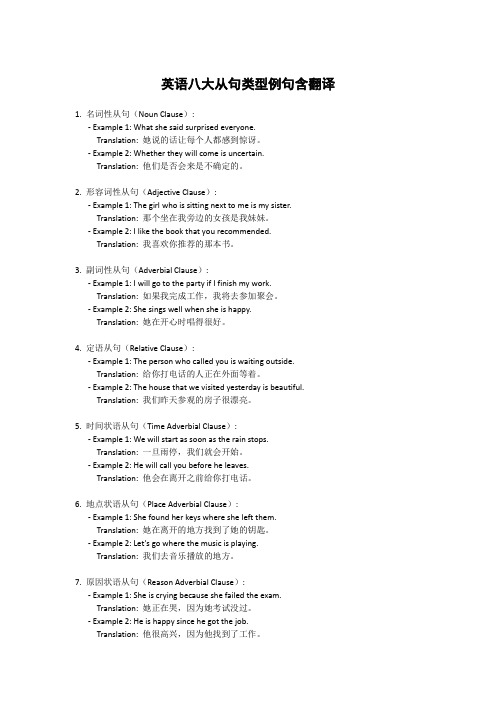
英语八大从句类型例句含翻译1. 名词性从句(Noun Clause):- Example 1: What she said surprised everyone.Translation: 她说的话让每个人都感到惊讶。
- Example 2: Whether they will come is uncertain.Translation: 他们是否会来是不确定的。
2. 形容词性从句(Adjective Clause):- Example 1: The girl who is sitting next to me is my sister.Translation: 那个坐在我旁边的女孩是我妹妹。
- Example 2: I like the book that you recommended.Translation: 我喜欢你推荐的那本书。
3. 副词性从句(Adverbial Clause):- Example 1: I will go to the party if I finish my work.Translation: 如果我完成工作,我将去参加聚会。
- Example 2: She sings well when she is happy.Translation: 她在开心时唱得很好。
4. 定语从句(Relative Clause):- Example 1: The person who called you is waiting outside.Translation: 给你打电话的人正在外面等着。
- Example 2: The house that we visited yesterday is beautiful.Translation: 我们昨天参观的房子很漂亮。
5. 时间状语从句(Time Adverbial Clause):- Example 1: We will start as soon as the rain stops.Translation: 一旦雨停,我们就会开始。
英语中从句类型

英语中从句类型
英语中的从句有以下几种类型:
1. 名词性从句(Noun Clauses):名词性从句在句子中起到名
词的作用,可以作主语、宾语、表语或同位语。
常见的名词性从句
包括宾语从句、主语从句、表语从句和同位语从句。
2. 定语从句(Adjective Clauses):定语从句用来修饰名词
或代词,并且不能独立存在。
通常由关系代词(who, whom, whose, which, that)或关系副词(where, when, why)引导。
3. 状语从句(Adverbial Clauses):状语从句可以表示时间、原因、条件、目的、结果、方式等状语关系。
常见的引导词有连词(while, when, because, if, unless, although, since, etc.)
和疑问词(where, when, why, how, etc.)。
4. 同位语从句(Appositive Clauses):同位语从句用来进一
步解释或说明前面的名词或代词,常由that引导,有时也可以用其
他关系词引导。
5. 感叹句型从句(Exclamatory Clauses):感叹句型从句用
来表示强烈的感情或感叹,通常由what, how, what a引导。
6. 名词化从句(Nominalization Clauses):名词化从句是将
一个完整的句子转化为一个名词,函数如同名词,可以作为主语、
宾语、表语等。
常见的名词化从句有不定式、动名词和现在分词作
为名词的一部分。
这些是英语中常见的从句类型,根据情况的不同,从句的结构和用法会有所变化。
英语的从句类型与用法总结

英语的从句类型与用法总结
英语的从句类型与用法总结如下:
1.定语从句:在复合句中,修饰名词或代词的从句叫定语从句,被修饰的名词或代词叫先行词,引导定语从句的有关系代词(who, whom, whose, which, that 等)和关系副词(where, when, why等),关系代词和关系副词在定语从句中担任句子成分。
2.状语从句:由从句担任的状语,在句子中可修饰谓语(或其它动词)、形容词、副词或是整个句子,它可以用来表示时间、地点、原因、目的、结果、条件、方式、比较、让步等。
3.名词性从句:在句子中起名词作用的句子叫名词从句(Noun Clauses)。
名词从句的功能相当于名词词组,它在复合句中能担任主语、宾语、表语、同位语、介词宾语等,因此根据它在句中不同的语法功能,名词从句又可分别称为主语从句、宾语从句、表语从句和同位语从句。
英语从句(最简单通俗易懂)

从句名词性从句:就是这个些从句的作用,相当于一个名词,按作用分类分成:主语从句、宾语从句、表语从句、同位语从句。
一、主语从句(名词性从句):引导词:1、that:万能词2、whether:是否,能否(表示怀疑)3、what:什么,……的东西4、whatever:无论……5、who:谁,(指人)6、whoever:无论谁,任何人7、which:那一个,指代前提提到的东西8、wichever:无论哪一个9、whose:谁的(所有格)10、whom:谁(who的宾格)11、whomever:无论谁,任何人(whoever的宾格)12、how:怎样,用什么方式13、why:为什么14、when:当……时候(表示时间)15、where:在……地点(表示地点)学习心得:从句在复合句中做主语,翻译的时候把一句话,就当一个名词来翻译二、宾语从句(名词性从句):引导词:1、that:万能词(无意思,只是符号,有的时候会省略)2、who:谁,(指人)3、why:为什么4、when:当……时候(表示时间)5、which:那一个,指代前提提到的东西6、what:什么,……的东西7、how:怎样,用什么方式8、whether:是否,能否(表示怀疑)9、if:如果(表示假设)注:放在非谓语动词(动名词)后面的句子也叫做宾语从句。
如:knowing that………………………………三、表语从句(名词性从句):引导词:1、that:万能词2、whether:是否,能否(表示怀疑)3、what:什么,……的东西4、whatever:无论……5、who:谁,(指人)6、whoever:无论谁,任何人7、which:那一个,指代前提提到的东西8、wichever:无论哪一个9、whose:谁的(所有格)10、whom:谁(who的宾格)11、whomever:无论谁,任何人(whoever的宾格)12、how:怎样,(表示方式)13、why:为什么(表示原因)14、when:当……时候(表示时间)15、where:在……地点(表示地点)16、as if:好像,似乎(表示可能)17、as though:好像,仿佛(表示可能)学习心得:用句子表示名词,在句中做表语,引导词跟主语从句一样。
英语从句辨析50个例句

英语从句辨析50个例句英语从句是英语语法中的一个重要部分,主要包括名词性从句、定语从句和状语从句。
以下是50个例句,用于帮助辨析不同类型的英语从句:一、名词性从句1、主语从句:What he said is not true.(他说的不是真的。
)2、宾语从句:I don't know if he will come.(我不知道他是否会来。
)3、表语从句:The question is who will go there.(问题是谁会去那里。
)4、同位语从句:The news that he resigned was surprising.(他辞职的消息令人惊讶。
)5、主语从句:Whether he will come or not remains uncertain.(他是否会来还不确定。
)6、宾语从句:I doubt whether he can finish the task on time.(我怀疑他是否能按时完成任务。
)7、表语从句:The question is when we should start the project.(问题是我们应该何时开始这个项目。
)8、同位语从句:The fact that she won the prize was a great honor for her family.(她获奖的事实对她家来说是一种极大的荣誉。
)9、The question whether we should proceed with the project remains unanswered. (我们是否应该继续这个项目的问题尚未回答。
)10、It's a fact that the company is going through a tough period. (公司正在经历困难时期,这是事实。
)11、The reason why he resigned was not made public. (他辞职的原因没有公开。
高中英语所有从句大全

高中英语所有从句大全从句是语法中的一个重要概念,它用来描述一个句子中含有另一个完整句子的情况。
在英语中,从句可以分为名词性从句、形容词性从句和副词性从句。
本文就高中英语所有从句分类详细介绍,以便广大学生更加深入了解英语语法知识。
一、名词性从句名词性从句是指充当句子中某一成分的从句,即作为名词使用的从句。
名词性从句根据其所承担的成分可以分为主语从句、宾语从句、表语从句和同位语从句。
1. 主语从句主语从句在句中充当整个句子的主语部分,通常以从句引导词 that 或 whether 开头。
例如:That he is guilty is beyond doubt.(他有罪是无疑的)Whether we will win the game is still unknown.(我们是否能赢得比赛还不确定)2. 宾语从句宾语从句在句子中作为动词的宾语,通常以从句引导词that,whether 或连接代词/副词引导。
用 that 引导的宾语从句可以省略 that。
例如:I believe that he will come.(我相信他会来)Do you know whether it will rain tomorrow?(你知不知道明天会不会下雨?)She asked me where I was going.(她问我我要去哪里)3. 表语从句表语从句在句子中作为系动词后的补语,通常以从句引导词 that,whether 或连接代词/副词引导。
例如:My worry is that I may fail the exam.(我的担忧是我可能会考砸了)The fact that he is absent worries me.(他缺课这个事实让我担心)It is important whether he will show up or not.(他是否到场很重要)4. 同位语从句同位语从句修饰一个名词或代词,解释或说明该名词或代词的具体内容,通常以从句引导词 that 开头。
英语中常用的六大从句

英语中六大从句用法总结1.主语从句1)主语从句可直接位于主语的位置,如果从句较长,谓语又较短,可用it作形式主语,而将从句放在句末。
常见的句型有:*It is a fact\a pity\a question\good news that (I)seems\appears\happened\has turned out that... *It is clear\important\likely\possible that... *It is said\reported\estimated\has been proved that... It is said that comic books create a connection between people of the same generation. It seems that the performance is very useful.2) what引导的主语从句表示“...的东西时”,一般不用it作形式主语。
What we lack is experience.3) what,who,when,why,whether等词含有各自的疑问意义,但它们引导的主语从句,都用陈述语序。
How the plan is to be carried out should be discussed again. I did know why I felt like crying.2.宾语从句1)宾语从句可位于及物动词、介词和某些形容词后。
连词that常可省略。
介词后一般接疑问词引导的宾语从句。
in that(因为),except that(除了),but that(只是)已构成固定搭配,其他介词后一般不接that引导的宾语从句。
*I promised that I would change the situation. *All this is different from what American young people would say about friendship. *He is certain that watching so much television is not good for children. *This article is well-written except that it is a bit too long.2) 宾语从句后如有宾补,要用形式宾语it来代替,而把宾语从句移至宾补之后。
英语中五大从句
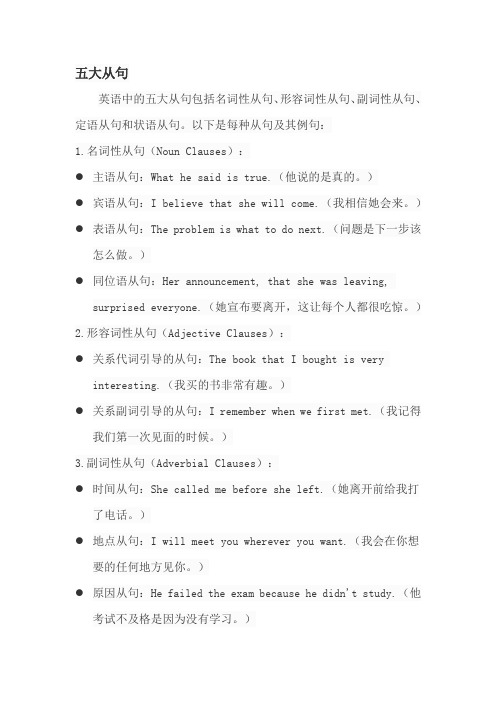
五大从句英语中的五大从句包括名词性从句、形容词性从句、副词性从句、定语从句和状语从句。
以下是每种从句及其例句:1.名词性从句(Noun Clauses):●主语从句:What he said is true.(他说的是真的。
)●宾语从句:I believe that she will come.(我相信她会来。
)●表语从句:The problem is what to do next.(问题是下一步该怎么做。
)●同位语从句:Her announcement, that she was leaving,surprised everyone.(她宣布要离开,这让每个人都很吃惊。
)2.形容词性从句(Adjective Clauses):●关系代词引导的从句:The book that I bought is veryinteresting.(我买的书非常有趣。
)●关系副词引导的从句:I remember when we first met.(我记得我们第一次见面的时候。
)3.副词性从句(Adverbial Clauses):●时间从句:She called me before she left.(她离开前给我打了电话。
)●地点从句:I will meet you wherever you want.(我会在你想要的任何地方见你。
)●原因从句:He failed the exam because he didn't study.(他考试不及格是因为没有学习。
)●条件从句:If it rains, we will stay indoors.(如果下雨,我们将呆在室内。
)●结果从句:He worked hard, so he succeeded.(他努力工作,所以成功了。
)4.定语从句(Adjective Clauses):●关系代词引导的从句:The man who is talking to my mother ismy uncle.(正在和我妈妈交谈的那个人是我叔叔。
英语六大从句

从句有主语从句、表语从句、宾语从句、同位语从句、定语从句和状语从句6类.前四类由于主语从句、表语从句、宾语从句及同位语从句在句子的功用相当于名词,所以通称名词性从句;后两类定语从句和状语从句功用相当于形容词,称为形容词性从句.状语从句还可以分为条件状语从句、原因状语从句、方位状语从句和时间状语从句.1.主语从句(Subject Clause):用作主语的从句叫主语从句.引导主语从句的关联词有从属连词、疑问代词、疑问副词、缩合连接代词、缩合连接副词等.2.表语从句 Predicative Clause):用作表语的从句叫表语从句.引导表语从句的关联词与引导主语从句的关联词大都一样.3.宾语从句(Object Clause):在句子中起宾语作用的从句叫做宾语从句.宾语从句分为三类:动词的宾语从句,介词的宾语从句和形容词的宾语从句.第一部分一.、定义:宾语从句就是一个句子作动词或介词的宾语.二、学习宾语从句要抓住三要素:连接词、语序和时态.连接词一般都是that(指事务或人),which 指事),who 指人)1.从句为陈述句,常选择连接词that或将that省略,直接与主句相连.2.从句为一般疑问句,常选择连接词if或whether.在whether…or not结构中不能用if替换. 3.从句为特殊疑问句,常选择what,when,where,which,who,how等的疑问代、副词作连接词.★当who为主语时,句式为:who+谓语+其他判断时态情况:1.主句是一般现在时,从句为各种时态情况2.主句是一般过去时,从句为各种相应过去时态注意:从句描绘客观事实,用一般现在时3.主句是一般将来时,一般从句为一般现在时 “主将从现”)例题:〈1. The teacher told the children that the sun__B__round.A. wasB. isC. wereD. are 答案为B,属于第二种情况.宾语从句,在复合句中作宾语,位于及物动词后;Tell him which class you are in .(1)主、从句时态一致:主句谓语过去时,从句相应过去时;He answered that he was listening to me.主句谓语现在时,从句时态任所需;He says (that) he will leave a message on my desk.具体过去永不变,真理格言现在时;He told me that he was born in 1980.2)否定前移,及完成反意问句;在think / believe / suppose / guess / imagine / expect等动词后跟宾语从句否定式时,应转移到主句上去,完成反意疑问句时,应与从句主、谓保持一致.(注: 否定前移的条件是,主句主语是第一人称)I don't think you are right ,are you ?3)在表示建议suggest , advise要求demand 、desire、require、request、propose;决定decide; 命令order、command; 坚决主张insist;等动词后跟宾语从句,用 should)+v. 虚拟语气)eg.I suggested that you should)study hard.4)如果宾语从句后有宾语补足语,用it作形式宾语,把宾语从句后置eg.You may think it strange that he would live there.5)宾语从句that常可省略,但在以下情况下不能省略A.当主句谓语动词带有两个或两个以上宾语从句时,可以省略第一个that,其他不能省略. eg.I believe that)you have done your best and that things will get bet?鄄ter.B.当it作形式宾语时eg.She made it clear that she had nothing to do with him.C.当宾语从句前置时eg.That our team will win,I believe.三、分类A 、作动词的宾语:eg.I heard the newsI 主语heard 谓语动词the news.名词作宾语I主语heard 谓语动词that he would come here later on.一个句子作宾语---宾语从句B 、作介词的宾语:eg.He said nothing about this plan .He主语said 谓语动词nothing 代词作动词的宾语about 介词the plan. 名词作介词的宾语四、带有宾语从句的复合句的构成:带有宾语从句的复合句就是用连接词把一个主句和一个宾语从句连接在一起.连接词有:that(可省略),what, who, when, where, why, which, if, whether, how.五、注意:A 宾语从句必须用陈述语序.False: He is wondering when can he finish this difficult job.Right: He is wondering when he can finish this difficult job.B 有时候可以用it 作形式宾语,而把真正的宾语从句放在后面.Bad: I thought that he could finish this job in just two hours impossible.Good: I thought it impossible that he could finish this job in just two hours.Bad: He left whether we should continue this project to my judgment.Good: He left it to my judgment whether we should continue this project.C 带有宾语从句的复合句的否定形式一般是否定主句.Bad: I think he doesn’t like the English teacher.Good: I don’t think he likes the English teacher.D False: He wanted to know why he is crying in the corner.Right: He wanted to know why he was crying in the corner.4.同位语从句(Appositive Clause):与先行词同位或等同的从句叫作同位语从句.其关联词多为that.5.定语从句 Attributive Clause):用作定语的从句叫定语从句.定语从句一般皆放在被它所修饰的名 代)词之后,这种名 代)词就叫作先行词 Antecedent).引导定语从句的关联词为关系代词(或称引导词、关系词等).关系代词在定语从句中可用作主语、宾语、定语等;关系副词在定语从句中用作状语.①引导定语从句的关联词有who, whom, whose, that, when, where, why 和which. 在非限制定语从句中, 只可用which, who, whose, where , when., 如果指代前面整个句子, 多用which.例句:The dog that/which was lost has been found. 失踪的狗已经找到了.)③as 可做引导词引导定语从句, 多和such, the same 连用. As 引导的定语从句也可修饰整个句子, 既可放在先行词后,也可放在句子开头.例句:Such people as you describe are rare nowadays. 你描述的那一类人现在很少了.)④介词+which/whom/whose从句The driver is the man from whose room she had stolen the gold watch. 她就是从那个司机的房间偷了金表的.)⑤代/名+介词+which 从句He is needing a book, the name of which I don't know.( 他需要一本书,但是我不知道书名.)⑥同位语从句和定语从句The news that you told me was really exciting. 你告诉我的好个消息真的是很激动人心.)⑦难句:NO.1He is one of the men who were chosen to represent the group. 他是被选为代表该团队的人中一员.)第二部分一、时态1·主句用一般现在时,从句可用任意时态.2·主句用过去时,从句用过去某个时态.3·主句用过去时,从句是真理时,只用一般现在时.二、宾语从句的几类连接词:①从属连词连接宾语从句的从属连词主要有that,if,whether. that引导表示陈述句的宾语从句,而if和whether引导表示“是否”的宾语从句.例句:I don’t know if there will be a bus any more.我不知道是否还会有公交车.②连接代词连接代词主要有who, whom ,whose ,what ,whoever ,whomever ,whosever, whatever, whichever等.连接代词一般指疑问,但what, whatever除了指疑问外,也可以指陈述.例句:Do you know who has won Red Alert game?你知道谁赢了这一局红警游戏吗?③连接副词连接副词主要有when,where,why,how,whenever,wherever,however等.例句:He didn’t tell me when we should meet again.他没有告诉我什么时候我们能再见面.三、动词的宾语从句大多数动词都可以带宾语从句We all expect that they will win , for members of their team are stronger.我们都预料他们会赢,因为他们的队员更强壮.★部分“动词+副词”结构也可以带宾语从句例句:I have found out that all the tickets for the concert have been sold out.我发现这场音乐会的所有票都卖光了.★动词短语也可以带宾语从句常见的这些词有:make sure确保make up one’s mind下决心keep in mind牢记例句:Make sure that there are no mistakes in your papers before you turn them in.在上交试卷前确保没有任何错误.四、可运用形式宾语it代替的宾语从句①动词find,feel,consider,make,believe等后面有宾语补足语的时候,则需要用it做形式宾语而将that宾语从句后置.例句:I think it necessary that we take plenty of hot water every day .我认为每天多喝开水是有必要的.②有些动词带宾语从句时寻要在宾语与从句前加it这类动词主要有:hate, take , owe, have, see to.例句:I hate it when they with their mouths full of food.我讨厌他们满嘴食物时说话.③若宾语从句是wh-类,则不可用it代替例句:We all consider what you said to be unbelievable.我们都认为你所说的是不可信的.五、介词的宾语从句用wh-类的介词宾语从句例句:We are talking about whether we admit students into our club.我们正在讨论是否让学生加入我们的俱乐部.★用that,if引导的介词宾语从句有时候except,but,besides三个介词后可见到that引导的宾语从句例句:I know nothing about my new neighbor except that he used to work with a company.对于我的新邻居我只知道他曾在一家公司上班,其他一无所知.六、形容词的宾语从句常用来引导宾语从句的形容词有:sure,certain,glad,please,happy,sorry,afraid,satisfied,surprised例句:I am sure I will pass the exam.我确信我会通过考试.七、if,whether在宾语从句中的区别①if和whether在作“是否”解时,引导宾语从句常放在动词know,ask,care,wonder,find out等之后,介词后一般不用if②少数动词,如:leave,put,discuss,doubt后的宾语从句常用whether.③whether后可以加or not,但是if不可以.④在不定式前只能用whether.如:I can’t decide whether to stay. 我不能决定是否留下.⑤避免歧异时,我们常用whether而不用if.八、哪些宾语从句不可以省略引导词that1.当that作learn,suggest,explain,agree,wonder,prove,mean,state,feel,hold等动词的宾语时;2.当宾语从句较长时;3.当主语状语置于主句尾,宾语从句之前时;4.当主语谓语动词(包括非谓语动词)与宾语从句之间有插入语时;5.当一个动词带有两个或两个以上宾语从句时,此时第一个that可以省略,第二个that不可以省略;6.当宾语从句中的主语是this,that或this,that做主语的定语时;7.当宾语从句是双宾语中的直接宾语时;8.当宾语从句的主语是非谓语动词或主语从句时;9.当主语中的谓语动词是固定词组时;10.当宾语从句有it做其先行词时;11.在直接引语中,转述分句把宾语从句隔开时.九、宾语从句的否定转移主句的谓语动词是think,believe,imagine,suppose,consider,espect,fancy,guess等,并且主句的主语是第一人称而且为一般现在时,从句的否定词一般要转移到主句上来,其反义疑问句一般与宾语从句一致.例句:I don’t think he will come to my party.而不能说成I think he won’t come to my party.我认为他不会来我的舞会.★如果宾语从句中有某个含有否定意义的形容词或副词,其反义疑问句要用肯定形式.例句:We find that he never listens to the teacher carefully,does he?我们发现他从来不仔细听老师讲课,是不是?十、宾语从句的时态和语序当主句为现在时或将来时的时候,宾语从句的时态一般不受主句的时态所影响.当主句为过去时的时,细分为一下几种情况:①从句用一般过去时或过去进行时表示与主句谓语动词动作同时发生例句:I only knew he was studying in a western country,but I didn’t know what country he was in.我只知道他当时在西方的一个国家读书,可不知道是哪个国家.②从句过去完成时表示该动作发生在主句谓语动作之前例句:He told me that he had told Mary about the meeting already.他告诉我他已经把有关会议的事情告诉的了Mary.③从句谓语用过去将来时表示该动作发生在主句谓语动作之后例句:The reporter asked if the government would take necessary measures to put down the to-do.记者问政府是否会采取必要的措施镇压骚乱.★如果从句是一个客观真理,那么从句的时候不根据主句的时态而变化例句:The teacher said that the moon goes around the earth yesterday.老师昨天说月亮绕着地球转.★当宾语从句的引导词是who,which,what,when,where,how,why等表疑问时,不能按正常语序安排,经常将这类引导词置于句首例句:Who do you think the public might choose as their favorite singer this year?你认为今年公众会选谁为他们最喜欢的歌手.同位语从句用法比较"固定",把关键的几个词背下来 下面这个材料供参考):一、在复合句中用作同位语的从句叫同位语从句.它一般跟在某些名词后面,用以说明该名词表示的具体内容.如:I had no idea that you were here.我不知道你在这里.二、可以跟同位语从句的名词通常有news,idea,fact,promise,question,doubt,thought,hope,message,suggestion,words消息),possibility等.如:I’ve come from Mr wang with a message that he won’t be able to see you this afternoon.我从王先生那里来,他让我告诉你他今天下午不能来看你了.三、英语中引导同位语从句的词通有连词that,whether,连接副词how,when,where等.( 注:if,which 不能引导同位语从句.)如:l have no idea When he will be back.我不知道他什么时候回来.四、有时同位语从句可以不紧跟在说明的名词后面,而被别的词隔开. 如:The thought came to him that maybe the enemy had fled the city.他突然想起可能敌人已经逃出城了.五、同位语从句与定语从句的区别.1、同位语从句与前面的名词是同位关系,即说明它前面名词的内容;而定语从句与前面的名词是修饰与被修饰关系,即限定它前面的名词范围,或补充一些情况.如:The news that l have passed the exam is true.我通过了考试这一消息是真的.同位语从句,即从句所表达的意思就是前面名词的内容.)The news that he told me just now is true.他刚才告诉我的消息是真的.定语从句,从句对前面名词起修饰限制作用,即“他告诉我的”那个消息,而不是别的消息.)2、引导同位语从句的that是连词,在从句中不充当任何成份,而引导定语从句的that是关系代词,除起连接作用外,还在从句中充当主语、宾语或表语等.如:The idea that computers can recognize human voices surprises many people.计算机能够识别人的声音的想法使许多人感到惊奇.that在从句中不充当任何成份.)一个名词(或其它形式)对另一个名词或代词进行修饰,限定或说明,这个名词(或其它形式)就是同位语.同位语与被它限定的词的格要一致,并常常紧挨在一起.1) 非独立的同位语:常出现在被限定词前Bruce Lee (姓名) 李小龙Graf Schmidt (称号,浑名) 施密特伯爵Doktor Wang (职称,头衔) 王博士Uncel Liu (亲戚的称呼) 刘叔叔die Stadt Shanghai (类属名称) 上海市the Province Hebei (类属名称) 河北省das Jahr 2000 (类属名称) 2000 年three Kilo tomato (度量名称) 三公斤西红柿the University Bremen (专有名词) 不来梅大学。
初中英语三大从句
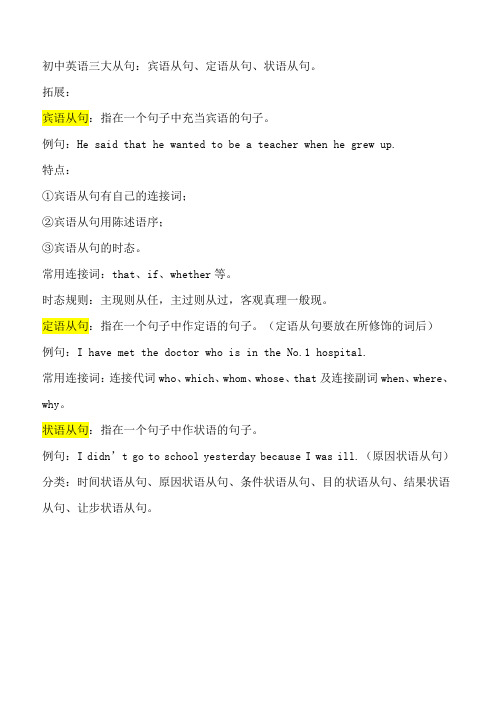
初中英语三大从句:宾语从句、定语从句、状语从句。
拓展:
宾语从句:指在一个句子中充当宾语的句子。
例句:He said that he wanted to be a teacher when he grew up.
特点:
①宾语从句有自己的连接词;
②宾语从句用陈述语序;
③宾语从句的时态。
常用连接词:that、if、whether等。
时态规则:主现则从任,主过则从过,客观真理一般现。
定语从句:指在一个句子中作定语的句子。
(定语从句要放在所修饰的词后)
例句:I have met the doctor who is in the No.1 hospital.
常用连接词:连接代词who、which、whom、whose、that及连接副词when、where、why。
状语从句:指在一个句子中作状语的句子。
例句:I didn’t go to school yesterday because I was ill.(原因状语从句)分类:时间状语从句、原因状语从句、条件状语从句、目的状语从句、结果状语从句、让步状语从句。
英语从句(最简单通俗易懂)

从句名词性从句:就是这个些从句的作用,相当于一个名词,按作用分类分成:主语从句、宾语从句、表语从句、同位语从句。
一、主语从句(名词性从句):引导词:1、that:万能词2、whether:是否,能否(表示怀疑)3、what:什么,……的东西4、whatever:无论……5、who:谁,(指人)6、whoever:无论谁,任何人7、which:那一个,指代前提提到的东西8、wichever:无论哪一个9、whose:谁的(所有格)10、whom:谁(who的宾格)11、whomever:无论谁,任何人(whoever的宾格)12、how:怎样,用什么方式13、why:为什么14、when:当……时候(表示时间)15、where:在……地点(表示地点)学习心得:从句在复合句中做主语,翻译的时候把一句话,就当一个名词来翻译二、宾语从句(名词性从句):引导词:1、that:万能词(无意思,只是符号,有的时候会省略)2、who:谁,(指人)3、why:为什么4、when:当……时候(表示时间)5、which:那一个,指代前提提到的东西6、what:什么,……的东西7、how:怎样,用什么方式8、whether:是否,能否(表示怀疑)9、if:如果(表示假设)注:放在非谓语动词(动名词)后面的句子也叫做宾语从句。
如:knowing that………………………………三、表语从句(名词性从句):引导词:1、that:万能词2、whether:是否,能否(表示怀疑)3、what:什么,……的东西4、whatever:无论……5、who:谁,(指人)6、whoever:无论谁,任何人7、which:那一个,指代前提提到的东西8、wichever:无论哪一个9、whose:谁的(所有格)10、whom:谁(who的宾格)11、whomever:无论谁,任何人(whoever的宾格)12、how:怎样,(表示方式)13、why:为什么(表示原因)14、when:当……时候(表示时间)15、where:在……地点(表示地点)16、as if:好像,似乎(表示可能)17、as though:好像,仿佛(表示可能)学习心得:用句子表示名词,在句中做表语,引导词跟主语从句一样。
英语所有从句大全(精选课件)

英语所有从句大全英语从句大全1)表语从句1。
定义:用作表语的从句叫做表语从句。
2.构成:关联词+简单句3.引导表语从句的关联词的种类:(1)从属连词that.如:Thetrouble is that I have lost his address。
麻烦是我把他的地址丢了。
...文档交流仅供参考...(2)从属连词whether,as,as if.如:He looked just as he had looked ten years befor e.他看起来还与十年前一样....文档交流仅供参考...The question is whether they willbe able to helpus.问题是他们是否能帮我们。
...文档交流仅供参考...注:从属连词if一般不用来引导表语从句,但as if却可引导表语从句,如:All this was over twenty years ago,but it’s as if it was only yesterday....文档交流仅供参考...这都是20多年前的事了,但宛如昨天一样。
能跟表语从句的谓语动词一般为系动词be,seem,look 等.如:It looked as if it wasgoing to rain。
看起来天要下雨了。
(3)连接代词who,whom,whose,what,which,whoever,whatever,whichever...文档交流仅供参考...连接副词 where,when,how,why。
如:The problem is who wecanget to repla ce her.问题是我们能找到谁去替换她呢。
...文档交流仅供参考...The questionis how he did it。
问题是他是如何做此事的。
That was what shedid this morning on rea ching the attic。
英语八大从句类型总结

英语八大从句类型总结主句和从句的划分方法是相同的。
句子的成分从谓语动词处来划分比较容易。
今天我们就一起来看看英语八大从句类型总结吧!从句是相对于主句而言的,即它是从属于某一个主句,而不能单独作一个句子。
在英语中,主要有三大从句,即名词性从句 (包括主语从句,宾语从句,表语从句,同位语从句)、形容词性从句 (即定语从句)、副词性从句 (即状语从句,包括时间、条件、结果、目从句是相对于主句而言的,即它是从属于某一个主句,而不能单独作一个句子。
在英语中,主要有三大从句,即名词性从句(包括主语从句,宾语从句,表语从句,同位语从句)、形容词性从句(即定语从句)、副词性从句(即状语从句,包括时间、条件、结果、目的、原因、让步、地点、方式等)。
主语从句用作主语,如::That the earth is round is true. 地球为圆的是真实的。
宾语从句用作宾语。
如:Do you know where he lives?表语从句用作表语,如:My opinion is that you should not go alone. 我的意见是你不应单独前往。
同位语从句用于解释说明前面的名词。
如:The fact that the earth is round is true. 地球是圆的的事实是真实的。
(that从句用于解释说明the fact)定语从句相当于一个形容词,用于修饰前面的名词。
如:The student who answered the question was John. 回答问题的学生是John.状语从句相当于一个副词,如:When it rains, I usually go to school by bus. 天下雨时,我通常坐公共汽车上学。
(时间状语) If he comes tomorrow, you will see him. 如果他明天来,你就可以看见他。
(if 引导的条件状语从句,其结构为:if +状语从句,+主句)。
英语中8种从句介绍-锐
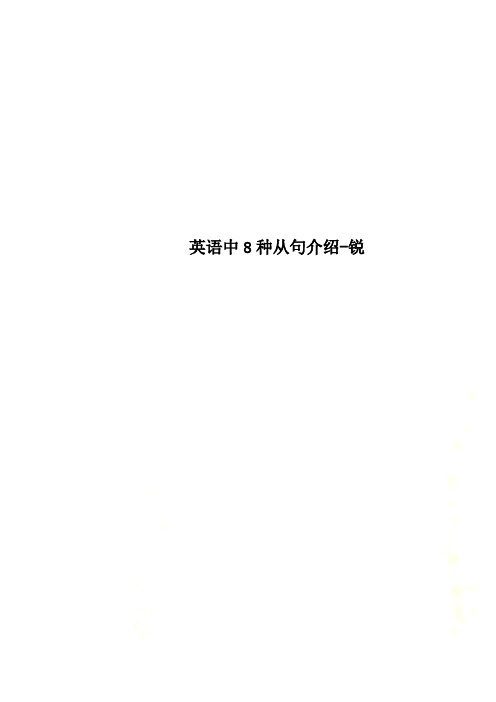
英语中8种从句介绍-锐从句是相对于主句而言的,即它是从属于某一个主句,而不能单独作一个句子.在英语中,主要有三大从句,即名词性从句(包括主语从句,宾语从句,表语从句,同位语从句)、形容词性从句(即定语从句)、副词性从句(即状语从句,包括时间、条件、结果、目的、原因、让步、地点、方式等).主语从句用作主语,如::That the earth is round is true.地球为圆的是真实的.宾语从句用作宾语.如:Do you know where he lives?表语从句用作表语,如:My opinion is that you should not go alone.我的意见是你不应单独前往.同位语从句用于解释说明前面的名词.如:The fact that the earth is round is true.地球是圆的的事实是真实的.(that从句用于解释说明the fact)定语从句相当于一个形容词,用于修饰前面的名词.如:The student who answered the question was John.回答问题的学生是John.状语从句相当于一个副词,如:When it rains,I usually go to school by bus.天下雨时,我通常坐公共汽车上学.(时间状语)If he comes tomorrow,you will see him.如果他明天来,你就可以看见他.(if 引导的条件状语从句,其结构为:if +状语从句,+主句).要注意在状语从句中有一个规则是“主将从现”,即主句是将来时,则从句要用一般现在时表示将来.主句和从句的划分方法是相同的.句子的成分从谓语动词处来划分比较容易.谓语动词前面的部分是主语,后面常接宾语,修饰谓语动词的是状语,修饰主语、宾语的是定语,若谓语是系动词,则系动词后的部分是表语.如:I am a teacher.其中,I 是主语,am是谓语,a teacher 是表语.He likes playing football very mucy.其中,he是主语,likes是谓语,playing football是宾语,very much是状语.英语中8种从句介绍1定语从句2时间状语从句3地点状语从句4条件状语从句5同位语从句6表语从句7宾语从句8主语从句名词性从句:在句子中起名词作用的句子叫名词从句(Noun Clauses).名词从句的功能相当于名词词组,它在复合句中能担任主语、宾语、表语、同位语、介词宾语等,因此根据它在句中不同的语法功能,名词从句又可分别称为主语从句、宾语从句、表语从句和同位语从句.引导名词性从句的连接词引导名词性从句的连接词可分为三类:连接词:that,whether,if 不充当从句的任何成分)连接代词:what,whatever,who,whoever,whom,whose,which.连接副词:when,where,how,why不可省略的连词:1.介词后的连词2.引导主语从句和同位语从句的连词不可省略.That she was chosen made us very happy.We heard the news that our team had won.比较:whether与if 均为"是否"的意思.但在下列情况下,whether 不能被if 取代:1.whether引导主语从句并在句首2.引导表语从句3.whether从句作介词宾语4.从句后有"or not"Whether he will come is not clear.大部分连接词引导的主语从句都可以置于句末,用 it充当形式主语.It is not important who will go.It is still unknown which team will win the match.)由从属连词that引导的从句叫做名词性that-从句.That只起连接主句和从句的作用,在从句中不担任任何成分,本身也没有词义.名词性that-从句在句中能充当主语、宾语、表语、同位语和形容词宾语,例如:主语:That he is still alive is sheer luck.他还活着全靠运气. 宾语:John said that he was leaving for London on Wednesday.约翰说他星期三要到伦敦去.表语:The fact is that he has not been seen recently.事实是近来谁也没有见过他.同位语:The fact that he has not been seen recently disturbs everyone in his office.近来谁也没有见过他,这一事实令办公室所有的人不安.形容词宾语:I am glad that you are satisfied with your job. 你对工作满意我感到很高兴.2)That- 从句作主语通常用it作先行词,而将that-从句置于句末,例如:It is quite clear that the whole project is doomed to failure.很清楚,整个计划注定要失败.It's a pity that you should have to leave.你非走不可真是件憾事一、什么是英语从句?要回答这个问题,先要弄清楚两个小问题:1、什么叫英语的句子一般情况下,英语句子中必定有一个主语和谓语,或者说,有主语和谓语组成的句子就是句子.例如:Mr. Wang teaches English in a middle school.Many trees were planted last spring.2、英语句子的成份英语的句子中,不仅只有主语和谓语,还有其它的句子成份,其中最主要的成份有:主语、谓语、宾语、状语、定语等.这几种成份在句子的位置大致是:(状语) + (定语)主语(定语) + (状语)谓语(状语) + (定语)宾语(宾语补足语) + (状语)也就是,定语一般位于主语和宾语的前后;状语一般位于谓语的前后;及物动词后一般接宾语和宾语补足语.有一点请注意:英语句子中状语的位置非常灵活,它在句首、句中、句末都可以.3、什么是英语的从句在明白了英语句子的成份之后,再来讨论英语从句就比较简单了.因为,什么叫从句呢?就是英语句中的某一成份不是一个单词或词组,而是一个句子,那么这个担任成份的句子就叫从句.如果定语是一个句子,它就叫定语从句;如果宾语是一个句子,它就是宾语从句.依此类推.例如:The boy and the dog [that are in the picture ]are very lovely. (括号中that开始的句子就是定语从句)We revisited the village [where we had worked before.] (括号中where引导的句子也是定语从句)He learned [that this was a hard work (which must be finished in a week.)] (这句里有两个从句,方括号由that引导的是宾语从句;在这个宾语从句中又包含了一个由which引导的定语从句.)因此,对于一个比较复杂的较长的英语句子来说,它就可能存在几个句子,即主句和担任各种成份的从句.从这个角度看,也可以说从句是句子中的句子.二、定语从句(Attributive Clauses)在句中做定语,修饰一个名词或代词,被修饰的名词,词组或代词即先行词.定语从句通常出现在先行词之后,由关系词(关系代词或关系副词)引出.关系代词有:who, whom, whose, that, which等.关系副词有:when, where, why等. 18.1 关系代词引导的定语从句关系代词所代替的先行词是人或物的名词或代词,并在句中充当主语、宾语、定语等成分.关系代词在定语从句中作主语时,从句谓语动词的人称和数要和先行词保持一致.1)who, whom, that这些词代替的先行词是人的名词或代词,在从句中所起作用如下:Is he the man who/that wants to see you?他就是你想见的人吗?(who/that在从句中作主语)He is the man whom/ that I saw yesterday.他就是我昨天见的那个人.(whom/that在从句中作宾语)2) Whose 用来指人或物,(只用作定语, 若指物,它还可以同of which互换), 例如:They rushed over to help the man whose car had broken down. 那人车坏了,大家都跑过去帮忙.Please pass me the book whose (of which) cover is green. 请递给我那本绿皮的书.3)which, that它们所代替的先行词是事物的名词或代词,在从句中可作主语、宾语等,例如:A prosperity which / that had never been seen before appears in the countryside. 农村出现了前所未有的繁荣.(which / that 在句中作宾语)The package (which / that) you are carrying is about to come unwrapped. 你拿的包快散了.(which / that在句中作宾语 18.2 关系副词引导的定语从句关系副词可代替的先行词是时间、地点或理由的名词,在从句中作状语.1)when, where, why关系副词when, where, why的含义相当于"介词+ which"结构,因此常常和"介词+ which"结构交替使用,例如:There are occasions when (on which) one must yield. 任何人都有不得不屈服的时候.Beijing is the place where (in which) I was born. 北京是我的出生地.Is this the reason why (for which) he refused our offer? 这就是他拒绝我们帮助他的理由吗?2)that代替关系副词that可以用于表示时间、地点、方式、理由的名词后取代when, where, why和"介词+ which"引导的定语从句,在口语中that常被省略,例如:His father died the year (that / when / in which) he was born. 他父亲在他出生那年逝世了.He is unlikely to find the place (that / where / in which) he lived forty years ago. 他不大可能找到他四十年前居住过的地方.用关系代词,还是关系副词完全取决于从句中的谓语动词.及物动词后面无宾语,就必须要求用关系代词;而不及物动词则要求用关系副词.例如:This is the mountain village where I stayed last year.I'll never forget the days when I worked together with you. 判断改错(注:先显示题,再显示答案,横线;用不同的颜色表示出.)(错) This is the mountain village where I visited last year. (错)I will never forget the days when I spent in the countryside.(对) This is the mountain village (which) I visited last year.(对) I'll never forget the days (which) I spent in the countryside.习惯上总把表地点或时间的名词与关系副词 where, when联系在一起.此两题错在关系词的误用上.内容提要定语从句是由关系代词和关系副词引导的从句,其作用是作定语修饰主句的某个成分,定语从句分为限定性和非限定性从句两种.状语从句分为时间状语从句,结果状语从句,让步状语从句,原因状语从句,条件状语从句以及行为方式状语从句.名词从句包括主语从句,宾语从句,表语从句和同位语从句及there be句型.一、限定性定语从句1. that即可代表事物也可代表人,which代表事物;它们在从句中作主语或宾语,that在从句中作宾语时常可省略关系词,which在从句中作宾语则不能省略.而且,如果which在从句中作“不及物动词+介词”的介词的宾语,注意介词不要丢掉,而且介词总是放在关系代词which的前边,但有的则放在它原来的位置2. which作宾语时,根据先行词与定语从句之间的语义关系,先行词与which之间的介词不能丢3. 代表物时多用which,但在带有下列词的句子中用that而不用which,这些词包括all, anything, much等,这时的that常被省略4. who和whom引导的从句用来修饰人,分别作从句中的主语和宾语,whom作宾语时,要注意它可以作动词的宾语也可以作介词的宾语5. where是关系副词,用来表示地点的定语从句6. when引导定语从句表示时间〔注〕值得一提的是,表示时间“time"一词的定语从句只用when引导,有时不用任何关系代词,当然也不用that引导By the time you arrive in London, we will have stayed there for two weeks.I still remember the first time I met her.Each time he goes to besiness trip, he brings a lot of living necessities, such as towers, soap, toothbrush etc.7. whose是关系代词,修饰名词作定语,相当于所修饰成分的前置所有格8. 当从句的逻辑主语是some, any, no, somebody, anybody, nobody, something, anything, everything或nothing时,常用there is来引导二、非限定性定语从句:非限定性定语从句的作用是对所修饰的成分作进一步说明,通常和主句间用逗号隔开,将从句拿掉后其他部分仍可成立1. which引导的非限定性定语从句来说明前面整个句子的情况或主句的某一部分2. 在引导限定性定语从句时,that有时相当于in which, at which, for which或at whichAttitudes towards daydreaming are changing in much the same way that(in which) attitudes towards night dreaming have changed. 人们对白日做梦的态度正在改变,这与人们对夜间做梦的看法的变化有非常相似之处.I like the music for the very reason that(for which) he dislike it. 我出于某种原因喜欢这种音乐,而他恰恰与我相反.We arrived the day that(on which) they left. 刚好我们到的那天他们走了.3. 有时as也可用作关系代词4. 在非限定性定语从句中,不能用that,而用who, whom代表人,用which代表事物先行词:是在定语从句中,被定语从句所修饰的名词.例如:He is a teacher who teach our English.在这里定词从句who teach our English是来修饰前面的名词teacher.所以teacher就是一个先行词.再说下它的用法:1、先行词指人时,引导词可用Who,Whom,及that,其中当引导词在句中作主语时用Who或that;当其充当宾语时用whom或that,在非正式宾语中也可用who,也可省略.a That boy who/that broke the window is called Tom.b The person to whom you just talked is Mr Li.b 句可改为:The person(that/whom/who)you just talked to is Mr Li.2、先行词指物时,引导词用that或whicha.They planted the trees which didn’t need much water.b .The fish (which)we bought were not fresh.3、先行词指时间时,引导词用When/on which或in whicha.I still remember the day when/on which I first came to Bei jing.b.I'll never forget the year when/ on which we worked on the farm.4、先行词指地点时,引导词用Where或in whichThis is the house where/in which we lived last year.或:This is the house that/which we lived in last year.5、whose在定语从句中作定语时,可用来指人,也可以用来指物,如:a.This is the boy whose mother died a month ago.b.This is the house whose windows were broken.此句可改成:This is the house the windoues of which were broken.6、先行词表示原因时,引导词用why,如:The reason why he was late for school was that he had been knocked down by a bike.二、物殊情况:尽管有以上基本原则,但要学好定语从句更应注意以下特殊情况;Ⅰ、当定语从句的先行词为表示人的不定代词,如anyone,anybody,everyone,everybody,noone,nobody,all,these ,those等时,用who而不用thatThose who break the rule are pulished.Anybody who had eyes could see the elephant was like a snake. Ⅱ.以who或which作主语的特殊疑问句中先行词指人,引导词只用That,如:a.Who is the person that is standing at the gate ?b.Which of you that knows something about English doesn’t know this word?Ⅲ、先行词指物时引导词用that而不用which的情况:1、先行词有序数词或形容词最高级修饰时,This is the best composition that has been written in English.2、先行词是all,something,anything,nothing,everything,little,few,much等不定代词时There is nothing/little/much that we can do for her.3、先行词被all,every,no,some,any,little,much等修饰时I’ve read all the books that you gave me.4、先行词被the only/very等修饰时This is the very/last place that they visited yesterday. 5、有两个以上先行词,分别表示人或物时They talked about the teachers and the schools that they had visited.6、先行词为基数时Yesterday I caught two fish,Now you can see the two that are still alive in a basin of water.Ⅳ.time为先行词时,前边如有序数词修饰时,定语从句引导词用that或什么也不用,如没序数词修饰时,用when或that均可a.This is the last time(that)I shall give you a lesson.先行词指人时,引导词可用Who,Whom,及that,其中当引导词在句中作主语时用Who或that;当其充当宾语时用whom或that,在非正式宾语中也可用who,也可省略.a That boy who/that broke the window is called Tom.b The person to whom you just talked is Mr Li.b 句可改为:The person(that/whom/who)you just talked to is MrLi.2、先行词指物时,引导词用that或whicha.They planted the trees which didn’t need much water.b .The fish (which)we bought were not fresh.3、先行词指时间时,引导词用When/on which或in whicha.I still remember the day when/on which I first came to Bei jing.b.I'll never forget the year when/ on which we worked on the farm.4、先行词指地点时,引导词用Where或in whichThis is the house where/in which we lived last year.或:This is the house that/which we lived in last year.5、whose在定语从句中作定语时,可用来指人,也可以用来指物,如:a.This is the boy whose mother died a month ago.b.This is the house whose windows were broken.此句可改成:This is the house the windoues of which were broken.6、先行词表示原因时,引导词用why,如:The reason why he was late for school was that he had been knocked down by a bike.。
英语所有从句大全

实用文档文案大全英语从句大全1)表语从句1.定义:用作表语的从句叫做表语从句。
2.构成:关联词+简单句3.引导表语从句的关联词的种类:(1)从属连词that.如:The trouble is that I have lost his address.麻烦是我把他的地址丢了。
(2)从属连词whether,as,as if.如:He looked just as he had looked ten years before.他看起来还与十年前一样。
The question is whether they will be able to help us.问题是他们是否能帮我们。
注:从属连词if一般不用来引导表语从句,但as if却可引导表语从句,如:All this was over twenty years ago,but it's as if it was only yesterday.这都是20多年前的事了,但宛如昨天一样。
能跟表语从句的谓语动词一般为系动词be,seem,look等。
如:It looked as if it was going to rain.看起来天要下雨了。
(3)连接代词who,whom,whose,what,which,whoever,whatever,whichever 连接副词 where,when,how,why.如:The problem is who we can get to replace her.问题是我们能找到谁去替换她呢。
The question is how he did it.问题是他是如何做此事的。
That was what she did this morning on reaching the attic.那就是她今晨上了阁楼干的。
解释:1.连词because可引导表语从句。
如:I think it is because you are doing too much.我想这是因为你做得太多。
英语从句(最简单通俗易懂)
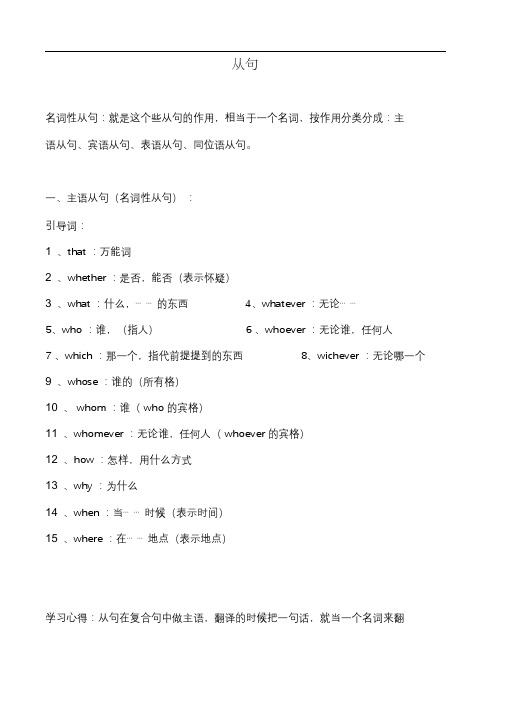
从句名词性从句:就是这个些从句的作用,相当于一个名词,按作用分类分成:主语从句、宾语从句、表语从句、同位语从句。
一、主语从句(名词性从句):引导词:1 、that :万能词2 、whether :是否,能否(表示怀疑)3 、what :什么,⋯⋯的东西4、whatever :无论⋯⋯5、who :谁,(指人) 6 、whoever :无论谁,任何人7 、which :那一个,指代前提提到的东西8、wichever :无论哪一个9 、whose :谁的(所有格)10 、whom :谁(who 的宾格)11 、whomever :无论谁,任何人(whoever 的宾格)12 、how :怎样,用什么方式13 、why :为什么14 、when :当⋯⋯时候(表示时间)15 、where :在⋯⋯地点(表示地点)学习心得:从句在复合句中做主语,翻译的时候把一句话,就当一个名词来翻二、宾语从句(名词性从句):引导词:1 、that :万能词(无意思,只是符号,有的时候会省略)2 、who :谁,(指人)3 、why :为什么4 、when :当⋯⋯时候(表示时间)5 、which :那一个,指代前提提到的东西6 、what :什么,⋯⋯的东西7 、how :怎样,用什么方式8 、whether :是否,能否(表示怀疑)9 、if :如果(表示假设)注:放在非谓语动词(动名词)后面的句子也叫做宾语从句如:knowing that ⋯⋯⋯⋯⋯⋯⋯⋯⋯⋯⋯⋯三、表语从句(名词性从句):引导词:1 、that :万能词2 、whether :是否,能否(表示怀疑)3 、what :什么,⋯⋯的东西4 、whatever :无论5、who :谁,(指人) 6 、whoever :无论谁,任何人7 、which :那一个,指代前提提到的东西8、wichever :无论哪一个9 、whose :谁的(所有格)10 、whom :谁(who 的宾格)11 、whomever :无论谁,任何人(whoever 的宾格)12 、how :怎样,(表示方式)13 、why :为什么(表示原因)14 、when :当⋯⋯时候(表示时间)15 、where :在⋯⋯地点(表示地点)16、as if :好像,似乎(表示可能)17 、as though :好像,仿佛(表示可能)学习心得:用句子表示名词,在句中做表语,引导词跟主语从句一样。
- 1、下载文档前请自行甄别文档内容的完整性,平台不提供额外的编辑、内容补充、找答案等附加服务。
- 2、"仅部分预览"的文档,不可在线预览部分如存在完整性等问题,可反馈申请退款(可完整预览的文档不适用该条件!)。
- 3、如文档侵犯您的权益,请联系客服反馈,我们会尽快为您处理(人工客服工作时间:9:00-18:30)。
状语从句 状语从句主要用来修饰主句或主句的谓语。
一般可分为九大类,分别表示时间、 地点、原因、目的、结果、条件、让步、比较和方式。
尽管种类较多,但由于 状语从句与汉语结构和用法相似,所以理解和掌握它并不难。
状语从句的关键 是要掌握引导不同状语从句的常用连接词和特殊的连接词即考点。
现分别列举 如下: 1.时间状语从句 引导词:when, as, while, as soon as, while, before, after, since, till, until, the minute, the moment, the second, every time, the day, the instant, immediately , directly, no sooner … than, hardly …when, scarcely … when I didn't realize how special my father was until I was 18. While Tom was watching TV, his wife was reading. No sooner had I arrived home than it began to rain. Every time I take your advice, I get into trouble. 2.地点状语从句 引导词:where, wherever, anywhere, everywhere Generally, air will be heavily polluted where there are factories. Wherever you go, you should bring the mp3 player with you. 3.原因状语从句 引导词:because, since, as, since, seeing that, now that, in that, considering that, given that, considering that, inasmuch as, insomuch as Now that everybody has come, let's begin our clas. Considering that he is no more than 10 years old, his height of 1.60 m is not normal. 4.目的状语从句 引导词:so that, in order that, lest, in case, for fear that, in the hope that, for the purpose that, to the end that The boss asked his secretary to give him the letter so that he could send it out himself. The instructor raised his voice that the students at the back could hear more clearly. 5.结果状语从句 引导词:so … that, so… that, such … that, such that, to the degree that, to the extent that, to such a degree that, He got up so early that he caught the first train. It's such a good chance that we must not miss it. 6.条件状语从句 引导词:if, unless, as/so long as, only if, providing/provided that, suppose that, in case that, on condition that We'll start our project if the manager agrees. You will certainly succeed so long as you keep on trying. Provided that there is no opposition, we shall call off the meeting. 7.让步状语从句 引导词:though, although, even if, even though, as(用在让步状语从句中 必须要倒装),while ( 一般用在句首),no matter …,in spite of the fact that, while, whatever, whoever, wherever, whenever, however, whichever Much as I respect him, I can't agree to his proposal. he old man always enjoys swimming even though it is cold. No matter how hard he tried, she could not change her mind. 8.比较状语从句 引导词:as(同级比较), than(不同程度的比较), 特殊引导词:the more … the more … ; just as …,so…; A is to B what /as X is to Y; no … more than; not A so much as B She is as bad-tempered as her mother. The house is three times as big as ours. The more you exercise, the healthier you will be. Food is to men what oil is to machine. 食物之于人,犹如油之于机器。
9.方式状语从句 引导词:as, as if, how, the way When in Rome, do as the Roman do. She behaved as if she were the boss. Sometimes we teach our children the way our parents have taught us. 定语从句 定语从句(Attributive Clauses)在句中做定语,修饰一个名词或代词,被修饰的名词,词组或代词即先行词。
定语从句通常出现在先行词之后,由关系词(关系代词或关系副词)引出。
关系代词有:who, whom, whose, that, which等。
关系副词有:when, where, why等。
18.1 关系代词引导的定语从句 关系代词所代替的先行词是人或物的名词或代词,并在句中充当主语、宾语、定语等成分。
关系代词在定语从句中作主语时,从句谓语动词的人称和数要和先行词保持一致。
1)who, whom, that 这些词代替的先行词是人的名词或代词,在从句中所起作用如下: Is he the man who/that wants to see you? 他就是你想见的人吗?(who/that在从句中作主语) He is the man whom/ that I saw yesterday. 他就是我昨天见的那个人。
(whom/that在从句中作宾语) 2) Whose 用来指人或物,(只用作定语, 若指物,它还可以同of which互换), 例如: Theyrushed over to help the man whose car had broken down. 那人车坏了,大家都跑过去帮忙。
Please pass me the book whose (of which) cover is green. 请递给我那本绿皮的书。
3)which, that 它们所代替的先行词是事物的名词或代词,在从句中可作主语、宾语等,例如: A prosperity which / that had never been seen before appears in the countryside. 农村出现了前所未有的繁荣。
(which / that在句中作宾语) The package (which / that) you are carrying is about to come unwrapped. 你拿的包快散了。
(which / that在句中作宾语18.2 关系副词引导的定语从句 关系副词可代替的先行词是时间、地点或理由的名词,在从句中作状语。
1)when, where, why 关系副词when, where, why的含义相当于"介词+ which"结构,因此常常和"介词+ which"结构交替使用,例如: There are occasions when (on which) one must yield. 任何人都有不得不屈服的时候。
Beijing is the place where (in which) I was born. 北京是我的出生地。
Is this the reason why (for which) he refused our offer? 这就是他拒绝我们帮助他的理由吗? 2)that代替关系副词 that可以用于表示时间、地点、方式、理由的名词后取代when, where, why和"介词+ which"引导的定语从句,在口语中that 常被省略,例如: His father died the year (that / when / in which) he was born. 他父亲在他出生那年逝世了。
He is unlikely to find the place (that / where / in which) he lived forty years ago. 他不大可能找到他四十年前居住过的地方。
18.3 判断关系代词与关系副词 方法一:用关系代词,还是关系副词完全取决于从句中的谓语动词。
及物动词后面无宾语,就必须要求用关系代词;而不及物动词则要求用关系副词。
例如: This is the mountain village where I stayed last year. I'll never forget the days when I worked together with you. 判断改错(注:先显示题,再显示答案,横线;用不同的颜色表示出。
